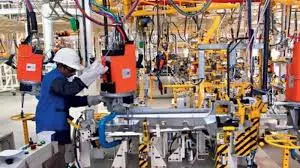By Guest Post
Copyright deccanchronicle

India is on the brink of a manufacturing renaissance. As global supply chains undergo realignment and domestic policy reforms gain traction, the country is poised to become a significant global manufacturing hub. From electronics to electricals, chemicals to automotive components, various sectors are ramping up production capacities, attracted by India’s scale, skilled labour, and increasingly favourable regulatory climate. Yet, in the midst of this optimism, one factor stands out as a decisive determinant of long-term success: financial discipline.Ambitious growth targets alone cannot ensure a sustainable manufacturing story. As businesses scale operations, enter new markets, and invest in capacity, they must do so with rigorous financial planning and execution. The coming decade won’t just be about expansion—it will be about efficient and responsible expansion. This distinction is vital, especially in a landscape where rising interest rates, supply chain fluctuations, and evolving compliance norms are testing traditional business models.Capital deployment, therefore, needs to be both bold and prudent. Companies can no longer afford to chase growth without a clear view on returns. Every rupee invested in plant and machinery, digital transformation, or R&D must be evaluated through a lens of ROI, cash flow impact, and long-term strategic value. Capital expenditure must not be mistaken for progress. What differentiates the enduring from the temporary will be a company’s ability to maintain lean operations, control leverage, and optimise working capital.The pandemic reshaped investor behaviour. The focus today is squarely on sustainability, not just in terms of ESG metrics but also in the financial sense—stability, predictability, and resilience. Businesses that maintain strong balance sheets, low debt, and efficient cash conversion cycles will not only survive downturns but attract premium valuations. In this climate, CFOs must lead with a value-based mindset, prioritising long-term profitability over short-term scale.An emerging area where financial discipline will play a critical role is the ESG-aligned capex landscape. With India making climate commitments under international agreements and pushing green manufacturing agendas, companies must now factor in energy efficiency, emissions reduction, and waste management into their capital investment decisions. Projects that improve environmental performance will increasingly be tied to favourable financing terms, particularly from international institutions and impact investors. This makes it imperative for financial leaders to treat sustainability metrics not just as compliance goals but as investment criteria.Parallelly, India’s Industry 4.0 movement—marked by IoT, AI, automation, and analytics—represents a significant opportunity and a financial challenge. Smart manufacturing initiatives promise productivity and agility, but they also demand significant upfront investment. To avoid the pitfalls of under-utilised technology, manufacturers must adopt rigorous cost-benefit frameworks. Technology investments should translate into measurable outcomes—lower inventory costs, reduced downtime, improved throughput—not just in theory but in measurable financial results.Moreover, this tech-led transformation increases the demand for transparent financial reporting. As operations digitise, stakeholders—from regulators to investors—expect real-time visibility into performance and risks. This necessitates strong internal controls, integrated ERP systems, and robust governance structures, all of which rely on financial discipline as their backbone.One of the most underestimated components of manufacturing success is supply chain resilience. Recent global events have shown how fragile traditional supply models can be. Companies must now invest in multi-sourcing, vendor risk management, and localised procurement. However, building redundancy into supply chains often comes at a cost. This is where financial planning becomes strategic. The ability to fund agility without bloating costs will separate industry leaders from followers.Human capital will also define the next wave of manufacturing success. As automation increases, so does the need for skilled technicians, engineers, and digital-savvy workers. Investments in training and workforce development must be part of the strategic financial agenda. Structured budgeting for skill development, tied to operational KPIs, can ensure that talent remains an enabler, not a bottleneck, for growth.India’s ascent as a manufacturing powerhouse is not in doubt. What is uncertain is which companies will thrive and which will falter. The difference will lie not in who spends more, but in who spends smarter. Financial discipline will be the bedrock of this journey—driving efficient growth, enabling technological adoption, ensuring ESG alignment, and building organisational resilience.The role of the CFO, therefore, is rapidly evolving. No…